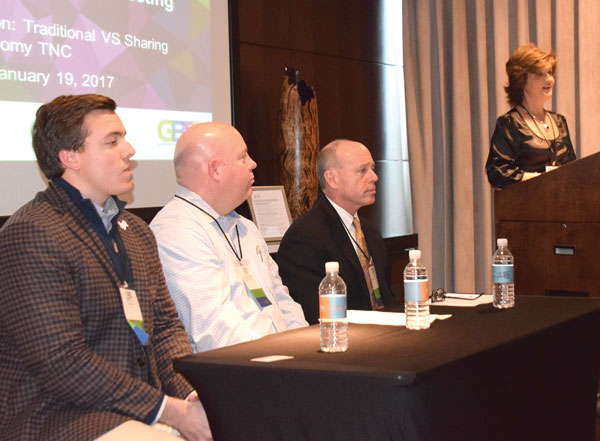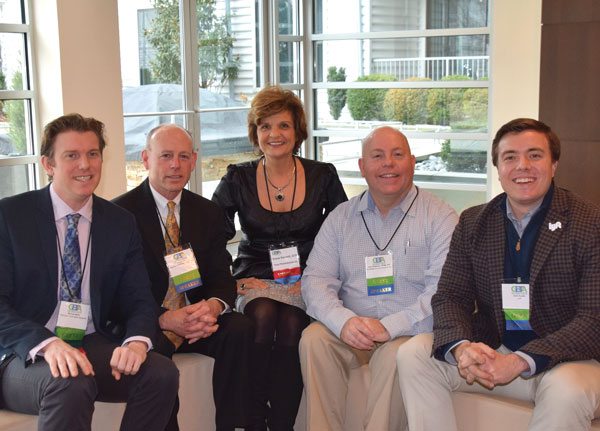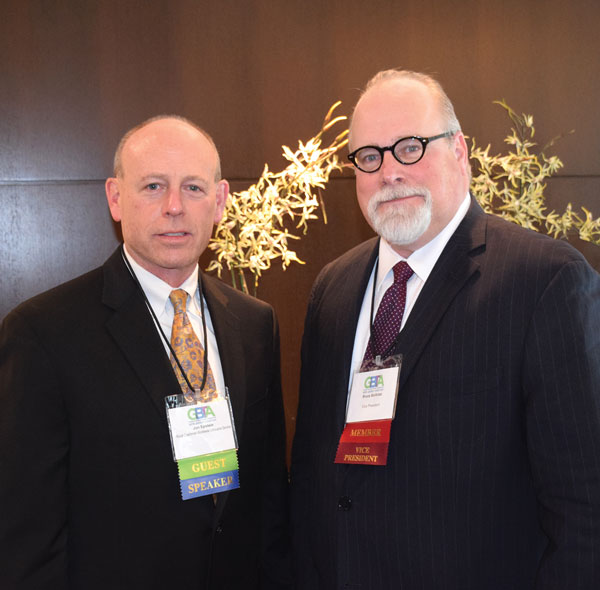 L to R: Zack Austin of Lyft, John Wohlleber of Broadridge Financial Solutions, Jon Epstein of Royal Coachman Worldwide, and Diane Perretti of Teva Pharmaceuticals On January 19, travel managers, transportation providers, and business travel insiders met at The Ave in Union, N.J., for the monthly meeting of the New Jersey Business Travel Association (GBTA-NJ). The highlight of the event was a session moderated by Michael Baker, senior editor of transportation for BTN Group, entitled Traditional vs. Sharing Economy: TNC Myths & Truths, which included firsthand perspectives from Royal Coachman Worldwide President Jon Epstein; Zach Austin, East Coast sales for Lyft; and John Wohlleber, senior director, Procurement & Travel, Broadridge Financial Solutions. The panelists spoke about their offerings in the corporate travel space, which prompted some lively feedback from the audience.
L to R: Zack Austin of Lyft, John Wohlleber of Broadridge Financial Solutions, Jon Epstein of Royal Coachman Worldwide, and Diane Perretti of Teva Pharmaceuticals On January 19, travel managers, transportation providers, and business travel insiders met at The Ave in Union, N.J., for the monthly meeting of the New Jersey Business Travel Association (GBTA-NJ). The highlight of the event was a session moderated by Michael Baker, senior editor of transportation for BTN Group, entitled Traditional vs. Sharing Economy: TNC Myths & Truths, which included firsthand perspectives from Royal Coachman Worldwide President Jon Epstein; Zach Austin, East Coast sales for Lyft; and John Wohlleber, senior director, Procurement & Travel, Broadridge Financial Solutions. The panelists spoke about their offerings in the corporate travel space, which prompted some lively feedback from the audience.
In addition to discussions about duty of care, insurance, and the unlevel playing field between TNCs and chauffeured ground transportation industry, what really came to light is that the on-demand companies are AGGRESSIVELY going after your corporate customers, especially Uber. TNCs are working deals and partnerships with many Fortune 500 companies to be added to their list of preferred vendors. It’s our recommendation that you are extremely proactive about talking with your clients, even if the contract is signed and not up for renewal for another 10 months. And while most travel buyers present at this meeting seemed to be in “our” corner—particularly in regard to safety and duty of care—many see the tide turning and have begun to adopt TNCs into their programs due to the demands of their travelers. In fact, according to a Certify poll shared by Baker, travel receipts for Uber and Lyft in 2016 outpaced those for taxis and black car services combined.
While each panelist was not given the opportunity to answer every question posed by the moderator and the attendees, we grouped their responses by topics relevant to our readers. The industry has been asking for a guide on addressing the concerns of corporate travel managers (CTMs), and this interview is a starting point. We’d also like to extend thanks to GBTA-NJ President Diane Perretti of Teva Pharmaceuticals for welcoming CD Editor Rob Smentek to this event.
 L to R: Michael Baker of BTN Group, Jon Epstein, Diane Perretti, John Wohlleber, and Zack Austin On Independent Contractors vs. Employees...
L to R: Michael Baker of BTN Group, Jon Epstein, Diane Perretti, John Wohlleber, and Zack Austin On Independent Contractors vs. Employees...
AUSTIN: 65 percent of the drivers on the Lyft platform are part time, so they drive fewer than 40 hours a week. They’re often mothers or retirees who want to make extra cash. The economic opportunity that we create is powerful. Full-time employment doesn’t make sense to everyone ... Driver partners who drive more than 40 hours a week have extraordinary earning power. We don’t charge a commission, and there are Power Driver Bonuses ... [But], they are independent contractors.
EPSTEIN: We provide qualified chauffeurs; we don’t have drivers. We have chauffeurs who are all employees, not independent contractors.
On Insurance...
AUSTIN: The state laws mandate that the driver has to carry a lump of insurance. Lyft then sits a million-dollar policy on top of that ... There is a lot of new insurance specifically designed for ridesharing. We’re continuing to craft policies that ensure safe rides and coverage. One of the interesting things about corporate travel is if I get into a taxi in San Antonio or a black car in Miami, the level of insurance those drivers is required to carry is patchwork in that it varies from region to region. Travel leaders can count on the Lyft program for having the million-dollar coverage we offer, no matter where in the country.
EPSTEIN: [Royal Coachman] provides proper and continuous insurance. In N.J., the state minimum for limos is $1.5 million: most companies have $5 million, we have $10 million in coverage. There’s no interruption. We have new and consistent vehicles that are properly maintained. They’re evaluated every day. They go into the mechanics’ shop every 2-3 weeks for oil changes and maintenance ... [Furthermore] look at the workers’ comp portion of it. If someone gets hurt while they’re driving one of your workers around, you know where they’re going—they’re going to you. It’s not just liability, it’s the workers’ comp side as well.
 Jon Epstein (left) and Bruce Boillotat of Royal Coachman Worldwide On Testing, Background Checks, and Safety...
Jon Epstein (left) and Bruce Boillotat of Royal Coachman Worldwide On Testing, Background Checks, and Safety...
AUSTIN: We meet every Lyft driver in advance, which some of our competitors in the same space can’t say they do. We also perform background checks using Sterling. It’s the same check used by the FBI and the Department of Defense. We have continual accountability after every ride with a five-star rating system ... There is variance [for follow-up testing] based on state law and what is required in the market. In California, testing is as frequent as every month, but in most markets it’s quarterly in terms of criminal checks. We have a local operations team in the major markets, and then satellite teams that do the interviews, which include a Lyft staffer and a five-star driver to do the drive along. For any driver to board the Lyft platform, they have to provide [proof of] current insurance and vehicle registration.
EPSTEIN: We provide proper background checks, including fingerprinting—that’s the gold standard. The cops use it, and even if you volunteer to be a little league coach, you’re fingerprinted. If you’re a broker, you’re fingerprinted. There’s a reason—it’s the best method of doing things. We also do pre-employment and random drug and alcohol testing. Royal Coachman and most companies I’m aware of have one-week comprehensive chauffeur training programs. Dedicated safety personnel come in and do a half-day training program, then they go on the road with them for half a day. Also, we have senior chauffeur mentors that will go out with a prospective applicant for two full days. We have confidential non-disclosure agreements from all our chauffeurs. Everything said in our cars stays in our cars. We do ghost rides to confirm quality. We ask our friends and clients to let us know how new chauffeurs are doing.
We never paid attention to ground transportation; it’s always been the redheaded stepchild of the travel industry.”
— Kathleen Kaden, Director, NA Travel, Corporate Card & Fleet Operations of Novartis Business Services
AUSTIN: We use really powerful language processing technology to look at the ratings we receive post-ride ... We have a dedicated, 200-person staff in Nashville constantly monitoring all reports around the country. If a passenger feels unsafe, for whatever reason, we deactivate the driver ... We have a comprehensive background check system ... We do a complete driving record check.
EPSTEIN: The real reason that Uber and Lyft don’t want fingerprinting is the churn rate of their drivers. They go through 68 percent of their drivers every month. They cannot afford to do fingerprinting because it slows down the process. They won’t have enough drivers out there. When I testified in front of the senate, I got to hear a fair amount of stuff, primarily from Uber, and the big question that a lot of politicians asked was “you fingerprint in New York City, which is two miles away, why can’t you fingerprint in N.J.? Do N.Y. residents deserve more attention?” To me, that was our fight all along. When you get down to it, it’s the churn rate ... It really comes down to what they can make. UberX is cheap and economical, but think about it from the driver’s side.
We had fingerprinting locked up in the N.J. legislature. We worked tirelessly. What happened was the constituents got wind of it. Uber and Lyft sent out PR emails—[addressing Austin] and you guys are phenomenal at it—and the governor got 14,000 signatures in a day and a half. The bottom line: The constituents tell the lawmakers what to put in the book.
(Editor’s note: A month after this panel took place, N.J. Governor Chris Christie signed into law the Transportation Network Company Safety and Regulatory Act to which Epstein refers. The extent of the background checks has not been determined. You can read more about it and the Limousine Association of New Jersey’s efforts on p. 92.)
On Self-Driving Cars...
WOHLLEBER: I’m looking forward to going to Pittsburgh [where the self-driving car pilot program is]. I’m curious. I want to see what my folks are getting involved with. I’m interested. Tesla’s already done it. I would like to experience it myself.
AUSTIN: John Zimmer, our cofounder, has a really big vision for self-driving cars. [He believes] they will be more widespread than people think, faster than people think. We’ve partnered with GM to focus on development of a self-driving car. They’re going to have a car with autonomous features that is going to be driving exclusively for Lyft in the near future. It’s something we’re focused on bringing into reality. I actually sat in a presentation from a JPMorgan analyst about self-driving cars. Think about the amount of time anyone spends behind the wheel of a car. Think about those billions of hours each day around the United States to give back to people to work, to play, to eat ... The potential to return those hours to the economy is massive. Lyft is excited to be part of it.
EPSTEIN: There’s no question it’s coming in the future. The same drivers who Uber and Lyft call “partners”—the end goal is to get rid of them. They’re saying and doing everything for their partners, but they don’t want them. For us, we do want them. So when [self-driving cars] do take over, we’re going to have a whole lot of qualified chauffeurs to help take care of people. I agree, it’s coming and it’s the future. We need to take care of our customers and give them service they want: opening doors, carrying luggage...
AUSTIN: [Zimmer] has a good analogy for the future of driverless cars: your cellphone. Your hard drive is made by Apple or Android; Samsung makes the hardware; Google makes the operating system; Verizon sends the data between. One day, you’ll have the manufacturer that makes the car, like GM or Ford. You’ll have software integrated in it, which might be Google. Then there’ll be the network—how you connect the person to their ride.
Anyone who does prearranged rides is a transportation company, any way you slice and dice it.”
— Jon Epstein, President of Royal Coachman Worldwide
On Disruption and Leveling the Playing Field...
EPSTEIN: Lyft is a transportation company. Anyone who does prearranged rides is a transportation company, any way you slice and dice it. Just because a ride comes in on an app—we send our drivers rides on an iPad. What’s the difference? Prearranged is prearranged. Saying they’re not a transportation company is part of the problem right from the get-go.
Right now, taxis are taking it on the chin. Most taxi companies are off 25-40 percent; medallions have been devalued. But, you know what? Competition is competition—as long as everyone plays by the same rules—that’s fine. Right now, 52 percent of all ground travel is done by Uber or Lyft. I can see the taxi industry’s gripes. They have to go through fingerprinting, permitting fees, this or that, and TNCs come in and don’t have to do anything. They persuade the public and legislators’ constituents, and that’s part of the problem.
AUSTIN: 15 years ago, we could have sat in this room and talked about how Amazon was going to do the same thing to your local Sears. Economy evolves and the nature of work evolves. Technology is going to accelerate these changes.
It’s a transformation in how people work and what the expectations are for what they want to do. We get asked about fingerprinting, a long-standing method of background checking. But it can also take weeks. That’s not feasible to do given the model these drivers are seeking to gain a little extra part-time work. This is ultimately both consumer and passenger choice that’s driving these transformations. Our message is that we want to work with you to understand these transformations. Lyft does a lot to keep our passengers safe—quite a bit more than our competitors do. I guarantee that anyone in this room could download the [Uber] app and say “Hey, I wanna drive” and you’d be driving by Sunday. You can’t say that about Lyft, because we require that in-person meeting.
WOHLLEBER: Think of the late ’70s, early ’80s. American car companies could not develop fuel-efficient and sexier cars. Everyone pooh-poohed the foreign cars. Guess what? We have competitive domestic cars now. They were a disrupter. If a disrupter can improve an endgame solution that benefits everyone, then so be it. That’s how the economy works.
On Meeting the Needs of Clients and Travel Managers...
EPSTEIN: There are companies out there doing black cars on-demand right now: You have iCARS, which is nationwide, you have miRide in Miami. There are multiple platforms [in New York] that are using licensed drivers. In our industry, there is a big movement now to create an app that is near-on-demand to help service our corporate customers and get us into that arena. The problem, as you know, with licensed W-2 employees is supply; that’s what makes it challenging. There are more than 600 companies nationwide that have “bought into” the concept, so to speak.
AUSTIN: Lyft treats our drivers better. We’re low margin ... we give 82 cents on the dollar to our drivers. So, economically, we don’t have the meat to cut off the bone. It’s more macro-shifting from taxis; on average we’re about 35 percent cheaper than a taxi. That’s where a company realizes savings.
We tend to collaborate around expense data. A benefit to corporate partnership is reporting, information on trips, and better visibility than you’d get from a handwritten taxi receipt. Over time, if we can shift 30 percent of your taxi trips, we can assume savings of hundreds of thousands of dollars.
WOHLLEBER: We continually get pressures from our CFOs: How can we do this differently? Obviously, we still need to get from point A to point B. Lyft is one solution; this (Royal Coachman) is another. We have to determine when we need this vs. when we need that.
If anything became evident from this session, it’s that the chauffeured transportation industry and TNCs are offering two very different services to the public. With TNCs barnstorming the corporate travel market—and making headway—it’s becoming increasingly vital for the chauffeured ground industry to work closely with CTMs and travel procurement departments to secure relationships or forge new ones. Now is the time to reach out to travel buyers and make it clear that our industry offers considerably more than their cheap ride—we offer peace of mind in a number of ways.
A full, unabridged recording of the panel is available online at bit.ly/2lvmqca. [CD0317]

